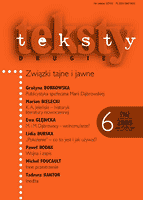"Pokolenie" - co to jest i jak używać?
“Generation” : What is it, and, how to cope with it?
Author(s): Lidia BurskaSubject(s): Literary Texts
Published by: Instytut Badań Literackich Polskiej Akademii Nauk
Keywords: Generation; Sociology; Literary History
Summary/Abstract: The Author reflects upon whether a literary scholar may find Kazimierz Wyka’s rather traditional concept of generation any useful. According to the said concept, generation is a symbol of difference, novelty, and besides, the change direction for the historical-literary (and, historical) process. Ms. Burska points out to troubles some contemporary scholars (Paweł Rodak, Danuta Zawadzka, and herself) encounter with the term, if so defined. She turns ‘generation’ as a reality-describing category into a notion requiring being reviewed and reinterpreted. Thus, she has singled out of the Wyka concept two styles of thinking proving mutually incoherent: the German humanities tradition of 19th century (from Hegel through to Ranke and Dilthey), and, Karl Mannheim’s sociology which took shape in the late 1920s/early 1930s. The former refers one to the grand story of modernity and its main character, i.e. History, making of the generations labelled ‘historic’, and of their leaders, ‘carriers’ and symbols of change, youth-and-novelty, and breakthrough in the historic process. In this concept, generations emerge from critical events, in order to testify to the momentousness of those events and their own role in them. According, in turn, to the sociological concept, not only do generations boil down to a ‘piled-up’ history but they also tend to get arranged ‘across’ the history: amongst peers by date-of-birth, whatever makes them different, or even extremely different, from one another is more important than things because of which they get united (unconscious emotional responses to events). These differences include various, consciously manifested, attitudes toward one’s own time, as different as their source intellectual traditions, class origins, etc., can be. This concept has it that generations are such moments in history where the synchrony and differentiated diachronies, the present and other times, get intersected. Those elements of the Wyka concept, incoherent as they are, overlap with some of the peculiar events of the latter half of 20th century as well, including the accelerated generational change and the decomposition of a hierarchical culture (with a centre and some authorities), which causes that subsequent generations of young people tend to live, as it were, beside one another, proving more similar to tribes or subcultures with no mutual tights whatsoever than to generations understood in terms of the Wyka concept. The Author does not formulate any unambiguous conclusions; rather than that, she poses questions whilst pointing to the need of having the term, as once introduced by K. Wyka to literary science, redefined and/or reinterpreted.
Journal: Teksty Drugie
- Issue Year: 2005
- Issue No: 6
- Page Range: 17-32
- Page Count: 16
- Language: Polish

